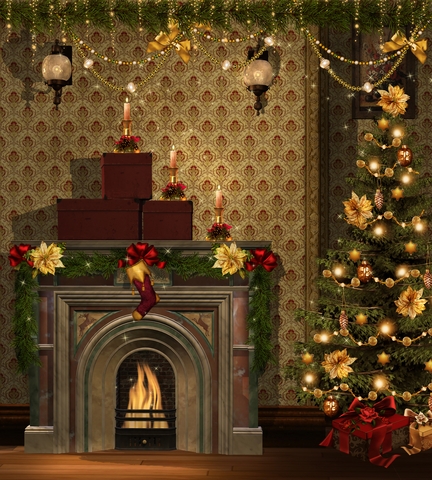Book Review: The Haunted House by Charles Dickens
Review: The Haunted House
Publisher: Dover Publications
Format: Print, 136 pages
Source: Purchased
The Haunted House is an anthology of connected stories, three of which Charles Dickens wrote, the others penned by writers of his time. The premise is that the narrator, for reasons of health (have you noticed how prominent discussions of health are in Victorian literature?) rents a country house for three months with his sister. They fall in love with the house and decide to invite their friends to stay with them. Because the house is reputedly haunted, the guests decide that on their last night together, which occurs during the Christmas season, they should tell the ghost stories of their various rooms. For instance, Wilkie Collins’s chapter is called “The Ghost in the Cupboard Room,” and Charles Dickens’s chapter is “The Ghost in the Corner Room.”
I decided to try this book because I’m a fan of Elizabeth Gaskell and wanted to sample her ghost fiction. I love her novels North and South and Cranford. I also love the story of Mary Barton, which I read in college. However, I recently tried to re-read Mary Barton and just could not manage the dialect she used for her working class characters. Pages of phonetic spelling filled with apostrophes stopped me in my tracks, and I haven’t been back to the wonderful story of Mary Barton. Unfortunately, Gaskell’s story in The Haunted House, “The Ghost in the Garden Room,” follows the same pattern of phonetic dialectal spelling, no doubt intended to enrich the reader with an authentic experience. For the modern reader, the opposite happens. We fall out of the story, mired in nearly incomprehensible dialogue. Here’s an example: “He’ll…be ‘a for settling in a quiet town life, wi’ a wife that’s noan so fur fra’ me at this very minute. An’ we oud folk, as we get into years, must gi’ up farm” (96).
It fair give me a headache, if ye follers me meanin’, which is unfortunate as “The Ghost in the Garden Room” did a nice job of setting a melancholy atmosphere in a prodigal son narrative.
I really liked the premise of the story–friends gathered round a fire telling stories feels almost Chaucerian. What a fun tradition among authors! Even Mary Shelley’s Frankenstein was created under the auspices of a friendly supernatural challenge. Henry James’s The Turn of the Screw and Susan Hill’s The Woman in Black also open with Victorian fireside entertainment.
 In addition to the set-up, I also enjoyed encountering new Victorian authors such as Hesba Stretton (whom I’d never heard of) but whose debut novel outsold Alice in Wonderland tenfold. Stretton awakened the Victorian sensibility to the plight of homeless children and started the movement of the Victorian orphan quest novel. I love orphan quest novels (A Little Princess, anyone?), so that alone impressed me. Moreover, Stretton co-founded the London Society for the Prevention of Cruelty to Children. Her story, “The Ghost in the Clock Room,” was one of my favorites and…you guessed it…featured an orphan.
In addition to the set-up, I also enjoyed encountering new Victorian authors such as Hesba Stretton (whom I’d never heard of) but whose debut novel outsold Alice in Wonderland tenfold. Stretton awakened the Victorian sensibility to the plight of homeless children and started the movement of the Victorian orphan quest novel. I love orphan quest novels (A Little Princess, anyone?), so that alone impressed me. Moreover, Stretton co-founded the London Society for the Prevention of Cruelty to Children. Her story, “The Ghost in the Clock Room,” was one of my favorites and…you guessed it…featured an orphan.
Although many of the chapters were interesting, The Haunted House didn’t live up to its potential. The stories didn’t seem to be ghost stories, nor, with the exception of Wilkie Collins’s tale “The Ghost in the Cupboard Room,” did they seem to have anything to do with the rooms of their occupants.

6 thoughts on “Book Review: The Haunted House by Charles Dickens”
Love the review! Will be reading this 🙂
Cool! Please let me know what you think.
The concept sounds extremely intriguing, but like you said – some times the “dialect” is so distracting that it kicks you WAY out of the story! Sounds like this may be one of those times…? Either way, I find it interesting that even back then there were authors compiling linking story anthologies!
To answer one of your questions – yes, Victorian materials DO focus quite a bit on health issues. Ah, the benefits of modern hygiene and plumbing LOL!!
I know. It sort of reminds me of sleep away camp with people telling stories around a fire. With all of our modern conveniences and abilities, we have lost something of the art of community-building. Wouldn’t you love to be a guest at a Victorian author’s fireside?
And yes, the benefits of modern hygiene (and dentistry). Though I seem to recall in one of Austen’s novels–Northanger Abbey, maybe–a character left a dinner party claiming illness because she knew it was the only acceptable excuse for leaving.
This sounds like a great read for this spooky season! I hear you about dialects being tres annoying at times. Hope not too many important plot points are buried beneath murky dialog.
No, it was only the Elizabeth Gaskell story that had such murky dialect. Sadly for me, that was the story I wanted to read the most. Oh, well. Otherwise, the writing was good but not as ghost-y as I would like. For a spooky book with a Victorian feel, I suggest This House Is Haunted or The Seance.